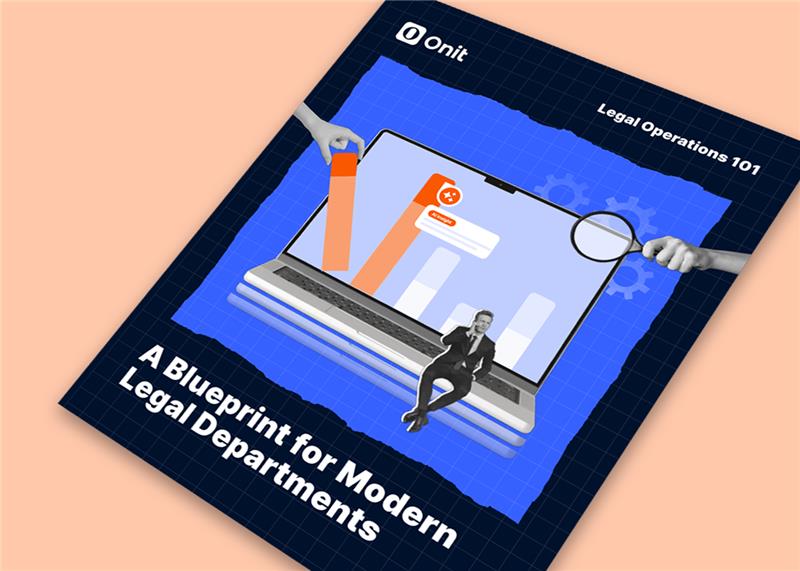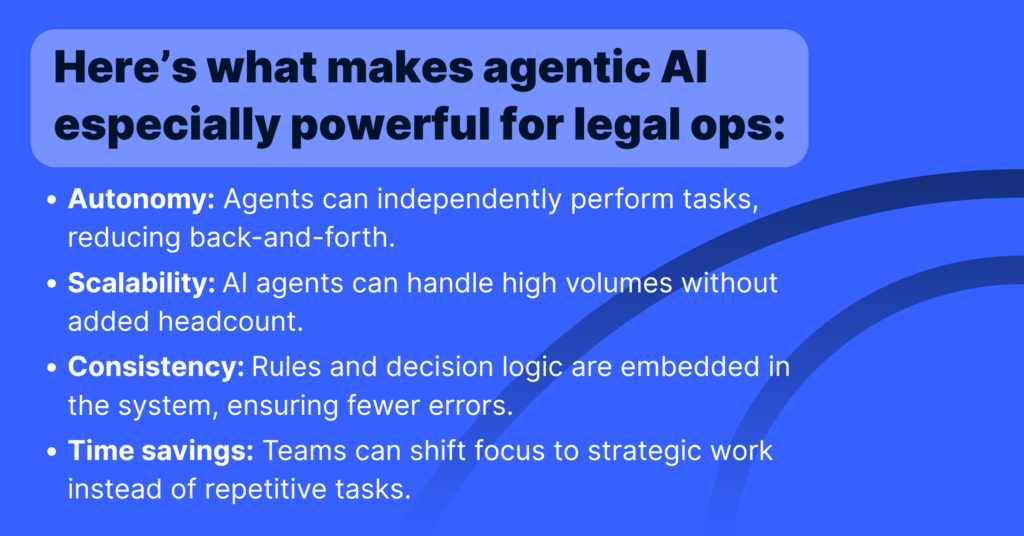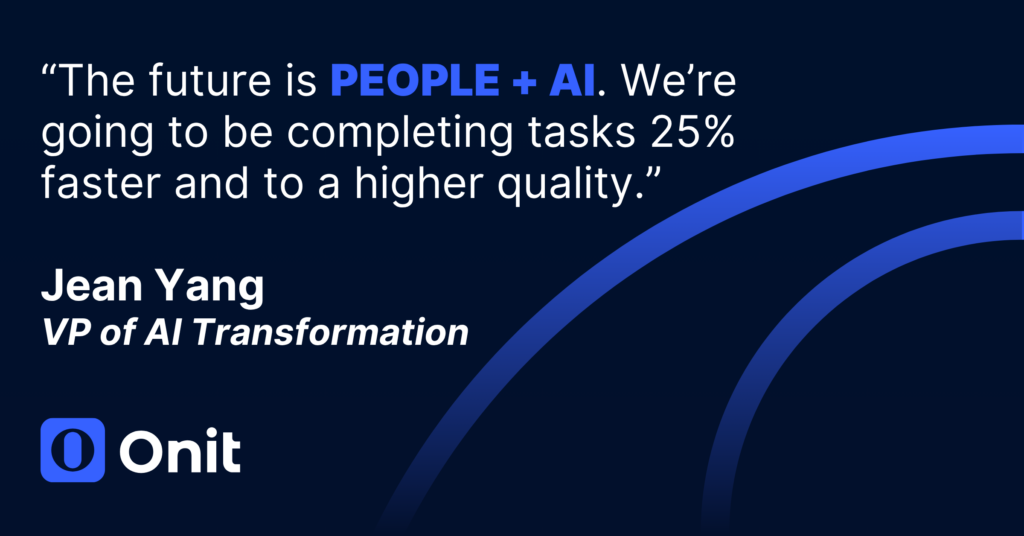
The future of legal operations refers to the shift from traditional process and spend management toward a strategic, AI-first model where legal departments drive business value. This future is already unfolding. Artificial intelligence is no longer limited to pilots or side projects. It is embedded in workflows, analyzing contracts, managing spend, and even completing tasks independently.
For legal ops leaders, this means technical knowledge is not enough on its own. To succeed in the future of legal operations, leaders need a new skill set that blends AI fluency, adaptability, and strategic leadership.
The future of legal ops requires leaders to develop new skills beyond technical expertise. The most important include AI fluency, strategic decision-making, adaptability, collaboration, and leadership. The AI Buyer’s Guide helps legal ops teams assess readiness and build a roadmap for success.
Why does the future of legal operations require new skills?
The future of legal operations requires new skills because the role of legal departments is evolving. Tasks that once depended entirely on humans — like reviewing contracts or processing invoices — are now supported or completed by AI. As a result, leaders must focus less on manual execution and more on orchestration: deciding which tasks belong with humans, which belong with AI, and how the two can work together.
This shift means the most valuable legal operations skills are no longer limited to compliance oversight or matter management. Leaders must now prioritize continuous learning, collaboration across functions, and the ability to guide teams through technological change.

What AI skills are essential for the future of legal operations?
The essential skills for the future of legal operations combine technical fluency with leadership and adaptability. The five most important AI skills for legal ops leaders are:
- AI fluency and prompting – understanding how AI systems work and how to interact with them effectively.
- Strategic decision-making with AI insights – interpreting Generative AI outputs within business context.
- Adaptability in hybrid human and AI teams – evolving roles and responsibilities as automation grows.
- Collaboration across AI-augmented workflows – aligning legal with other enterprise systems.
- Leadership for the AI era – coaching, hiring, and inspiring teams through change.
Each of these skills ensures that legal departments can use AI not just to reduce costs but to elevate their role as a trusted business partner.
1. AI fluency and prompting
AI fluency means knowing how to use AI responsibly, effectively, and efficiently. Prompting is a core part of this skill. The way a request is phrased can determine whether an AI tool produces a generic output or a tailored, actionable insight. Legal ops leaders need to model this fluency for their teams and provide frameworks that help staff improve. With the right AI prompting skills, legal departments can move beyond surface-level outputs to gain meaningful guidance that supports strategy.

2. Strategic decision-making with AI insights
AI tools can process thousands of contracts, invoices, or data points in seconds. But they cannot replace human judgment. The future of legal operations depends on leaders who can take AI-driven insights and apply them in the right business context. For example, when AI highlights risk in a contract, a skilled leader knows how to weigh that risk against revenue timelines, supplier relationships, or market pressures. This balance of data-driven insights and human judgment is where legal ops adds its greatest value.
3. Adaptability in hybrid human and AI teams
As AI takes on more tasks, legal departments will increasingly become hybrid teams — with humans and AI agents working side by side. Adaptability is the skill that allows leaders to evolve roles, reallocate responsibilities, and help people focus on higher-value work. Legal ops leaders must prepare their teams for constant evolution, ensuring they are comfortable shifting into new responsibilities as AI expands. Adaptability is no longer a soft skill; it is a critical capability for operational success.
4. Collaboration across AI-augmented workflows
Collaboration has always been central to legal operations, but in the age of AI it extends beyond people. Legal must now coordinate with AI systems that integrate into finance, procurement, and compliance functions. Strong collaboration skills ensure that legal data and workflows align with enterprise systems rather than existing in silos. Leaders who foster cross-functional trust and transparency will position their departments as true business partners in the future of legal operations.

5. Leadership for the AI era
The most important skill for the future of legal operations is leadership itself. AI adoption requires guiding teams through uncertainty, setting a clear vision, and rethinking how to hire and coach talent. Instead of recruiting only for technical expertise, leaders must now prioritize curiosity, adaptability, and a growth mindset. Coaching teams means not just teaching them how to use tools, but helping them challenge assumptions, question outputs, and continuously learn. Leaders who embrace this approach will build legal departments that thrive in any environment.
How can legal ops leaders prepare today?
To prepare for the future of legal operations, leaders need both awareness of critical skills and the right frameworks to assess their technology and team readiness. This is where practical guidance makes the difference. Onit’s AI Buyer’s Guide offers a clear framework for evaluating whether your current solutions and processes are ready to support AI-driven legal operations. It helps you identify gaps, prioritize investment areas, and build a roadmap that positions your team to succeed in the years ahead.
Leading the future of legal operations
The future of legal operations will not be defined by technology alone. It will be shaped by the leaders who know how to combine AI tools with human skills. Legal ops leaders who build fluency in AI, make strategic decisions with confidence, adapt to hybrid teams, collaborate across the enterprise, and lead through change will set their departments apart. These are not skills for tomorrow. They are the capabilities legal teams must begin strengthening today.
The future of legal operations belongs to leaders who act now.
Download the AI Buyer’s Guide to start evaluating your current environment and take the first step toward building the skills and systems that matter most.







